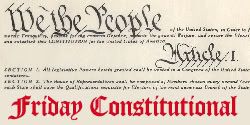( – promoted by buhdydharma )

Happy Friday and welcome to the 17th installment of Friday Constitutional! Sorry for the late posting, the Dog has been in meetings all day! For those of you that are joining us for the very first time, this is a weekly series taking a layman’s look at the Constitution of the United States. If you are interested in the previous installments, you can find them at the following links:
Last week we covered Amendments Thirteen and Fourteen, so we will kick this week off with the last of the Reconstruction Era Amendments.
Amendment Fifteen:
Section One:
The right of citizens of the United States to vote shall not be denied or abridged by the United States or by any State on account of race, color, or previous condition of servitude.
This Amendment is seems very simple but it really was a critical step for the recently freed slaves. The Untied States did not just end their involuntary servitude, with this act they went on to make them, well the men anyway, full citizens by guaranteeing their right to vote. Of course it was not really that easy. Sadly laws are only any good when they are actually enforced the way that they were written. That took another 90 years or so, but it was still a major step forward.
Section Two:
The Congress shall have power to enforce this article by appropriate legislation.
Section Two is the standard boiler plate granting the Congress the responsibility of legislating to ensure enforcement. Constitutional fun fact: The last State to ratify this Amendment was Tennessee, in 1997!
Amendment Sixteen:
The Congress shall have power to lay and collect taxes on incomes, from whatever source derived, without apportionment among the several States, and without regard to any census or enumeration.
The Sixteenth Amendment is an interesting one in that it is a direct response to a Supreme Court ruling, Pollock v. Farmers Loan and Trust Co. Prior to the Civil War all taxes were apportioned by the population of the State where you lived. To the Dog that is very strange way to think of taxes, but it is what the Federal Government did. During the Civil War an income tax was instituted to fund the war. It taxed income above $800 a year at 3%. This was changed a few times during the war. In 1894, the Pollock decision made it impossible to tax income that was derived from land, in terms of rent or from stocks in term of dividends. The Congress responded with this Amendment which was ratified 19 year later, allowing all forms of income to be taxed.
Amendment Seventeen:
The Senate of the United States shall be composed of two Senators from each State, elected by the people thereof, for six years; and each Senator shall have one vote. The electors in each State shall have the qualifications requisite for electors of the most numerous branch of the State legislatures.
When vacancies happen in the representation of any State in the Senate, the executive authority of such State shall issue writs of election to fill such vacancies: Provided, That the legislature of any State may empower the executive thereof to make temporary appointments until the people fill the vacancies by election as the legislature may direct.
This amendment shall not be so construed as to affect the election or term of any Senator chosen before it becomes valid as part of the Constitution.
In 1913 this Amendment changed the way that US Senators were elected. Originally in Article One, Section Three the election of US Senators was left to the legislature of each State, not the people.
The second paragraph empowers the Governor of the State to fill any vacancy, except when the legislator acts to set some kind of special election for the post. This is how Gov. Blagojevich was able to appoint Sen. Burris to his current seat. Note that it says “Shall” not “may”. That is very important as it makes it clear that it is actually a requirement of the Governor to appoint a Senator to a vacant seat.
The only way that would not happen is if the Legislature had decided to not allow a sitting Governor to appoint a temporary Senator to fill the seat until there could be a special election. To the best of the Dogs knowledge there is no State that goes that far. So even if the Legislature of the State of Illinois had acted to create a special election it seems likely that we would have had someone appointed by Governor Blagojevich in that seat today.
Currently Sen. Russ Feingold is proposing a 28th Amendment to force all States to hold special elections and so short circuit the power of Governors to appoint anyone they feel like to one of the highest offices in the land. It will be interesting to see if he and Rep Dreier in the House can actually pass this Amendment and what provision they make for a caretaker Senator. After all it is hardly fair to the people of any State to have a 50% reduction in the amount of Senatorial representation just because of a tragic death or resignation.
We will call it here for this week. So, citizens, any thoughts on Amendments 15, 16 or 17?
The floor is yours!

3 comments
Author
Amendments? Anyone? Anyone, Bueller? Anyone?
The sad thing about amendment 15 is that it had to be written at all. Our Constitution and consequently our country would have been a much better nation if we had done away with slavery with the original document.